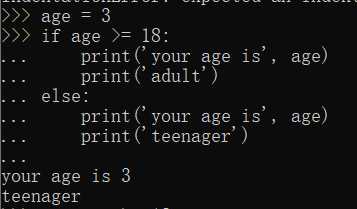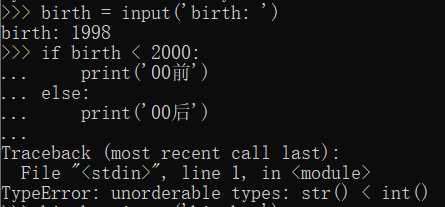标签:读取 call -- 同学会 一个 意思 自己 order 完整
------------恢复内容开始------------
计算机之所以能做很多自动化的任务,因为它可以自己做条件判断。
比如,输入用户年龄,根据年龄打印不同的内容,在Python程序中,用if语句实现:
age = 20
if age >= 18:
print(‘your age is‘, age)
print(‘adult‘)
根据Python的缩进规则,如果if语句判断是True,就把缩进的两行print语句执行了,否则,什么也不做。
也可以给if添加一个else语句,意思是,如果if判断是False,不要执行if的内容,去把else执行了:
age = 3
if age >= 18:
print(‘your age is‘, age)
print(‘adult‘)
else:
print(‘your age is‘, age)
print(‘teenager‘)
注意不要少写了冒号:。
当然上面的判断是很粗略的,完全可以用elif做更细致的判断:
age = 3
if age >= 18:
print(‘adult‘)
elif age >= 6:
print(‘teenager‘)
else:
print(‘kid‘)
elif是else if的缩写,完全可以有多个elif,所以if语句的完整形式就是:
if <条件判断1>: <执行1> elif <条件判断2>: <执行2> elif <条件判断3>: <执行3> else: <执行4>
最后看一个有问题的条件判断。很多同学会用input()读取用户的输入,这样可以自己输入,程序运行得更有意思:
birth = input(‘birth: ‘)
if birth < 2000:
print(‘00前‘)
else:
print(‘00后‘)
输入1982,结果报错:
Traceback (most recent call last):
File "<stdin>", line 1, in <module>
TypeError: unorderable types: str() > int()
这是因为input()返回的数据类型是str,str不能直接和整数比较,必须先把str转换成整数。Python提供了int()函数来完成这件事情:
s = input(‘birth: ‘)
birth = int(s)
if birth < 2000:
print(‘00前‘)
else:
print(‘00后‘)
再次运行,就可以得到正确地结果。但是,如果输入abc呢?又会得到一个错误信息:
Traceback (most recent call last):
File "<stdin>", line 1, in <module>
ValueError: invalid literal for int() with base 10: ‘abc‘
原来int()函数发现一个字符串并不是合法的数字时就会报错,程序就退出了。


标签:读取 call -- 同学会 一个 意思 自己 order 完整
原文地址:https://www.cnblogs.com/2205254761qq/p/12271640.html